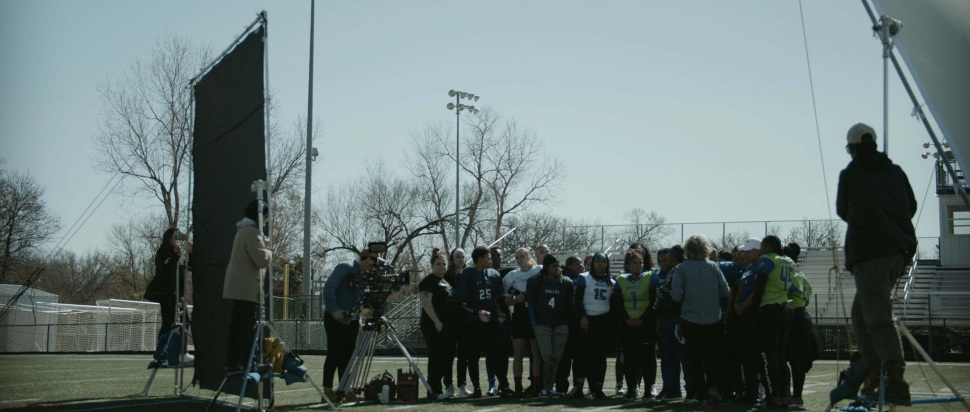Sharon Hayes introduces her Ricerche film works
Sharon Hayes' series of art films, Ricerche, see her interviewing large groups of people all at once. The simple premise belies the complexity of the work that emerges, and its sharp insights on sex and sexuality
It’s an impossible set-up for an interview. Artist Sharon Hayes admits this when speaking about her series of works, titled Ricerche. In the first of these film works from 2013, Hayes holds a microphone, acting as interviewer of a group of 35 students in Ricerche: three. It takes place in a US women's college, Mount Holyoke. Hayes asks frank questions about sex, and what emerges is a complex and tense multiplicity of experiences around being transgender, the limits of strident liberal multiculturalism, and the misogynies that are folded into dogmatic ideas of sexual freedom.
Hayes takes her cue in these films from a 1964 Italian film Comizi d’amore (Love Meetings) by renowned director Pier Paolo Pasolini. In it, he's experimenting with cinéma verité – truthful cinema, using non-professional actors, not scripting all the dialogue, filming on location rather than on a set.
“Pasolini comes to it as an imposter, he’s not really a director of cinema verité, he’s a director of allegorical narrative... Rather than seeking out a truth in cinema in the beginning conventions of the genre, which is the interview with the single body, he goes straight to his interest, I think, in more a relational, complicated and messy sense of 'public'... he’s asking very personal questions in group formation, and so the demand is to be both their social selves and their singular selves which is sort of an impossible proposition. You see them and hear them navigate and negotiate that in the film all the time.”
Already in the first test interview, Hayes realised her interest not “in replicating [Pasolini’s] film but expanding or drawing certain sections of it out. Like constructing an impossible scene of interview, you cannot interview 35 people at one time. It’s not what you’re supposed to do. It’s not reasonable because you can’t really have a conversation because you can’t get the mic to all of them at one time, and that became interesting to me.”
The time gaps between the different references and parts of the project have, over the years, become more complicated. First, there’s the gap between Pasolini in 1964, then the first Ricerche title in 2013. Now there are two further works, dated 2019 and 2020. Then there’s further complexity, Hayes reveals, in that the 2019 work was filmed in 2015, after which there was a gap until it was edited and completed in 2019.
In Ricerche: one (the second chronologically of the series, filmed in 2015), the year is significant as the Supreme Court in the US legalised gay marriage. "So for that population of kids of LGBTQ+ parents [the interviewees in Ricerche: one (2019)], that year becomes symbolically resonant, with me trying to understand the gap between the two generations, the five to eight year olds then the 17 [to early 30s].” When installed, there are two screens back to back. Two sets of separate footage run simultaneously as Hayes interviews each of the groups.
"In some ways they feel a part of a shared community or that they have these crossovers and affinities and intersections, but they’re actually in very different socially constitutive moments. That’s why I sat on the footage for so long. I was in a way troubled by that gap, or I didn’t know what to make of that gap, though I felt that both generations were really important. When I went back to it, I decided to hold them in this place of touching but not speaking to each other directly. Because the installation is actually back to back. If you’re watching the young people you’re not watching the [older group and vice versa]. That became important for thinking through, as fundamental as I could call generation or inheritance.” Hayes describes this as an “obsession” of Pasolini’s, too, who is always asking questions about “a previous generation” or in 1963 he asks about “the past with a nod to the future.”
Hayes mentions a few times the way that interviewees undercut her, playfully laugh at her, or touch and fidget with each other’s hair (as in Ricerche: three). This is one reason why the groups are essential in the structure Hayes sets up. “It’s really important to me that in some ways they take authority. They don’t take authorship, you [as audience] know they’re not responsible for the editing [for example]. They know more about everything than I do. They have a sociality that is present that I’m not a part of. I may provoke them, then they play or tease me back by sometimes physical things they have with each other or laughing at me or prodding me, playing with me back.” Out of the semi-anarchy Hayes brings the possibility of nuance, subversion of prejudgments and flashes of poignant insight. And maybe that's one of the most satisfying reveals. Just because Hayes might hold the mic throughout the Ricerche films, she's not interested in control.
Ricerche, by Sharon Hayes, hosted by The Common Guild, 5 Florence Street, Glasgow, 9 Oct-7 Nov
thecommonguild.org.uk/programme/project/ricerche-6b86
